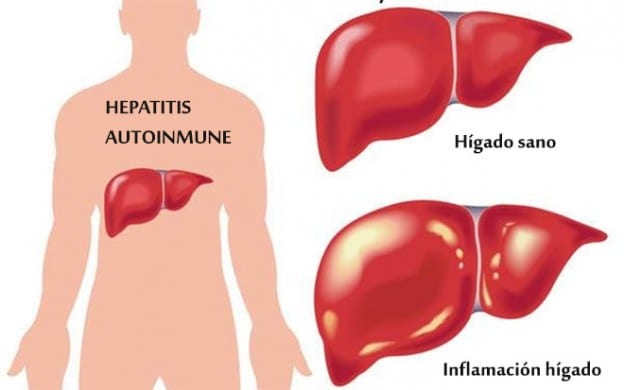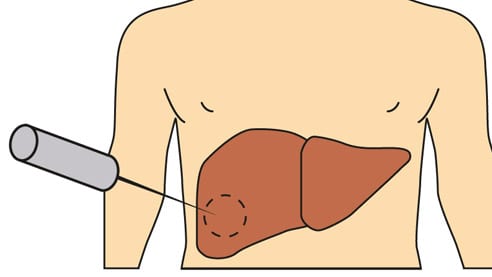
Concept and symptoms
Autoimmune hepatitis is a autoimmune diseasein which the patient's own immune system attacks the liver causing inflammation and cell death.. The disease is chronicle and progressive. Although the disease is chronic, many patients with autoimmune hepatitis present with jaundice, fever and sometimes symptoms of severe liver dysfunction, a picture that resembles acute hepatitis.
Autoimmune hepatitis typically occurs in women (70% of cases) between the ages of 15-40 years.. Although the term lupoid hepatitis was originally used to describe this disease, patients with systemic lupus erythematosus do not have an increased incidence of autoimmune hepatitis and the two diseases are distinct entities.
Following the New England Journal of Medicine patients usually present with moderate to severe evidence of hepatitis with elevated serum ALT and AST activities and slightly elevated alkaline phosphatase and gamma-glutamyltranspeptidase activities. The patient sometimes has jaundice, fever and right upper quadrant pain and occasionally systemic symptoms such as arthralgias, myalgias, polyserositits and thrombocytopenia.. Some patients present with mild liver dysfunction and have only laboratory abnormalities as initial presentation. Others will present with a severe liver dysfunction.
Autoimmune hepatitis should be suspected in any young patient with hepatitis.especially those without alcohol, drug, metabolic, metabolic or viral aetiologies risk factors. Serum protein electrophoresis and autoantibody tests are of vital importance in the diagnosis. of autoimmune hepatitis. Patients with one subtype of autoimmune hepatitis have serum gamma-globulin levels more than twice normal and antinuclear antibodies and anti-smooth muscle antibodies. Patients with another subtype may have normal or slightly elevated serum gamma-globulin levels but will have antibodies against a particular cytochrome p450 isoenzyme called anti-LKM (kidney-liver microsomes).

Patients with a suspected diagnosis of autoimmune hepatitis should have a liver biopsy.. If the biopsy is consistent, treatment with steroids (prednisone or pednisolone) and azathioprine (Imuran) is started immediately. These are tapered over the next 6 to 24 months, depending on the patient's progress. If immediate liver biopsy is contraindicated due to prolonged prothrombin time or thrombocytopenia, steroids and azathioprine should be started before biopsy if the diagnosis of autoimmune hepatitis is based on clinical criteria (e.g. a young woman with severe hepatitis, elevated serum gamma-globulin concentration, negative risk factors and serologies for viral hepatitis). The patient usually improves rapidly and biopsy should be performed to confirm the diagnosis as soon as the prothrombin time decreases and the platelet count increases to within safe ranges.
About two-thirds to three-quarters of patients with autoimmune hepatitis respond to treatment based on the return of serum ALT and AST activities to normal and an improved biopsy. after several months. Some patients relapse when doses of steroids and azathioprine are lowered or stopped and need chronic maintenance drugs. In the long term, many patients develop cirrhosis despite a response to treatment, and patients who do not respond to treatment almost always progress to cirrhosis.. If end-stage liver disease develops, the orthotopic liver transplantation is an effective procedure.


0 thoughts on “¿Qué es la hepatitis autoinmune?”
Could you please inform me about treatments or solutions for autoimmune hepatitis, as my partner has been treated for years.
Good morning, sorry for the delay in replying. At Biosalud Day Hospital we are specialists in the treatment of autoimmune and chronic diseases. However, we cannot give a precise answer because our treatments are personalised. First of all, we carry out an exhaustive analysis to determine the origin of the illness and, based on this, we design the treatment protocol. Biological medicine is particularly effective as it aims to strengthen the immune system. For some months now, we have also been developing immunotherapy treatments for autoimmune diseases with good results.
If you want you can make an appointment at our offices in Madrid or Zaragoza on 0034 976 22 11 33. Thank you for your consultation and best regards